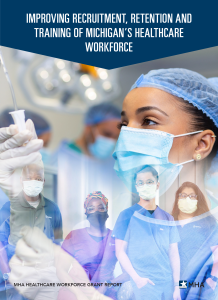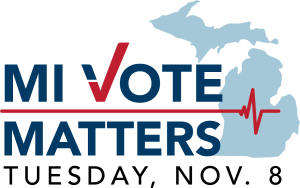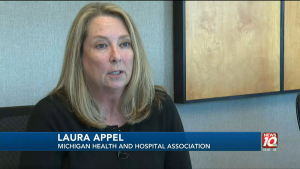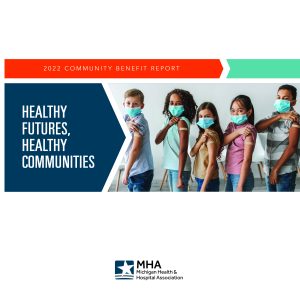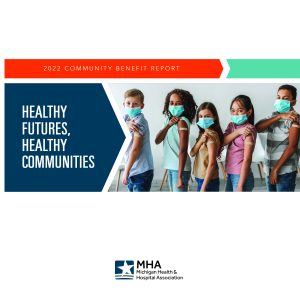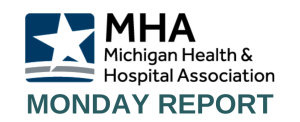
 Healthcare Worker Protections Headed to Governor
Healthcare Worker Protections Headed to Governor
Legislation increasing penalties for violence committed against healthcare workers was approved by the state House of Representatives in a bipartisan vote during the week of Oct. 30. The MHA-supported bills increase fines for assaulting a healthcare …
 Michigan Hospitals Invested $784 Million in Community and Voluntary-based Activities to Improve Health, Well-being of Residents
Michigan Hospitals Invested $784 Million in Community and Voluntary-based Activities to Improve Health, Well-being of Residents
New report outlines hospital community health efforts in FY 2021 The Michigan Health & Hospital Association released today the Making a Difference in Our Communities report that highlights how hospitals invested more than $784 …
Beyfortus Supply Shortages & CDC Guidelines
Beyfortus (nirsevimab) is a long-acting monoclonal antibody for the prevention of respiratory syncytial virus lower respiratory tract disease in infants approved by the U.S. Food and Drug Administration in July 2023. The MHA has …
 C.S. Mott Children’s Hospital MRI Technologist Receives Speak-up! Award
C.S. Mott Children’s Hospital MRI Technologist Receives Speak-up! Award
The Michigan Health & Hospital Association Keystone Center a Dragan Spremo at University of Michigan Health C.S. Mott Children’s Hospital with the quarterly MHA Keystone Center Speak-up! Award on Oct 23. The MHA Keystone Center …
Registration Open for Virtual DEI Certificate Program
Registration is open for the Diversity, Equity and Inclusion in Healthcare certificate program offered Dec. 7 and Dec. 8 from 11 a.m. to 3 p.m. ET. The event, hosted by the Michigan Health & Hospital …
HHS Submits Information Blocking Disincentives Proposed Rule
The U.S. Department of Health and Human Services (HHS) recently submitted a proposed rule outlining penalties providers would face if they do not appropriately share patient data as outlined in the 21st Century Cures Act. …
MDHHS Launches Opioid Settlement Spending Webpage
The Michigan Department of Health and Human Services (MDHHS) recently published a webpage to track the allocation of $800 million received for opioid settlement investments. MDHHS Chief Medical Executive Dr. Natasha Baghdasarian indicated the website …
MHA Launches New Governance Affinity Group
Hospitals and health systems face significant adversity, yet Michigan providers continue to provide high quality and accessible healthcare to their communities, in great part because of governing boards, executives and staff leadership. Board and committee …
 MHA CEO Report — Registration is Representation
MHA CEO Report — Registration is Representation
As we have discussed in these monthly reports in the past, I am incredibly proud that the MHA is committed to the health equity journey, which once again has been identified by the MHA Board of Trustees as …
The Keckley Report
 Six Majority Beliefs about the U.S. Health System Compromise its Value Proposition
Six Majority Beliefs about the U.S. Health System Compromise its Value Proposition
“As news cycles go, this one was standard fare for healthcare: with the exception of business plan announcements by organizations or as elements of tragedies like Lewiston, Gaza or a pandemic, the business of the health system—how it operates is largely uncovered and often subject to misinformation or disinformation. …
In the next 3 weeks, attention will be on the federal budget: healthcare will be in the background unless temporarily an element of a mass tragedy. Each trade group will tout its accomplishments to regulators and pimp their advocacy punch list. Each company will gin-out news releases and commentary about the future of the system will default to think tanks and focused on a single issue of interest.
That’s the problem. In this era of social media, polarization, and mass transparency, these old ways of communicating no longer work. Left unattended, they undermine the value proposition on which the U.S. system is based.”
News to Know
- The MHA will host a virtual member from 2 to 3 p.m. on Nov. 9 to outline the MHA 2023 – 2024 strategic action plan approved by the MHA Board of Trustees.
- The Centers for Medicare and Medicaid Services recently released an updated 2024 Medicare & You Handbook which provides information for patients regarding traditional Medicare, Medicare prescription drug plans, Medicare Advantage and more.

 Healthcare Worker Protections Headed to Governor
Healthcare Worker Protections Headed to Governor Michigan Hospitals Invested $784 Million in Community and Voluntary-based Activities to Improve Health, Well-being of Residents
Michigan Hospitals Invested $784 Million in Community and Voluntary-based Activities to Improve Health, Well-being of Residents C.S. Mott Children’s Hospital MRI Technologist Receives Speak-up! Award
C.S. Mott Children’s Hospital MRI Technologist Receives Speak-up! Award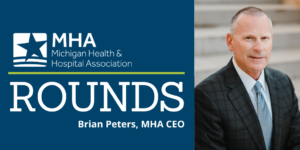 MHA CEO Report — Registration is Representation
MHA CEO Report — Registration is Representation
